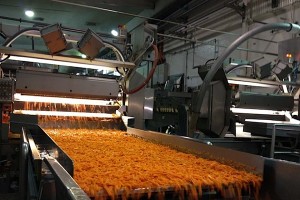
The latest data from the Australian Industry Group (AIG) Australian Performance of Manufacturing Index (PMI) indicates that Australia's manufacturing sector has contracted for the third month in a row, and that subdued domestic demand is offsetting the benefits of a weaker Australian dollar. The food and beverage sub-sector’s ninth month of expansion, lights an otherwise gloomy picture.
The PMI fell 3.6 points to 45.4. This is the third straight month that the index has remained below 50, the reading that separates industry-wide expansion from contraction.
"While there are bright patches, most notably for food & beverages and producers of building materials, weak domestic demand from businesses and households is offsetting the boost that many domestic manufacturers might have expected to flow from the weaker Australian dollar. Particular drivers of flat domestic demand include the sharp drop in mining construction, the progressive closure of automotive assembly and weak local business investment. The lower dollar has also lifted the prices paid for imported inputs, putting additional pressure on manufacturers' margins. On the positive side, the lower dollar and its further depreciation since September 2014 have boosted manufacturing export volumes over recent months,” AIG chief executive, Innes Willox, stated.
The sub-index for exports remained at 53.9 and has now been in expansion for three straight months.
Manufacturing production fell 3.7 points to 45, while the sub-indices for supplier deliveries (46.9) and stock levels (47) also slid into contraction.
Just three of the eight manufacturing sub-sectors expanded in February, if at slightly slower paces: Food, beverages and tobacco (down 2.8 points but registering 60.1), textiles, clothing & furniture (down 3.4 points but registering 56.0), and the non-metallic mineral products (down 2.3 points but registering 66.2).
The sub-indices of machinery and equipment (up 1.4 points to 43.5), printing and recorded media (up 2.2 points to 48.3), metal products (up 1.9 points to 45.0), and wood and paper products (down 3.6 points to 41.5) all continued to contract this month.
The Petroleum, coal, chemicals & rubber products sub-index (down 6.0 points to 34.7) fell to its lowest reading since June 2009, with the rapid decline in global oil prices, the ongoing decline of local mining construction activity, and the progressive closure of automotive assembly weighing on sales of Australian-made chemical inputs and components.
Among the activity sub-indexes, only manufacturing exports (unchanged at 53.9 points) expanded in February. Manufacturing production declined for a fourth month, new orders (down 3.4 points to 44.2) declined for a third month, and manufacturing sales (steady at 45.3) recorded a ninth consecutive month in contraction.
Manufacturing employment contracted for a second month in February (down 1.6 points to 45.9).
Input costs remain elevated (up 5.1 points to 72.4), while selling prices continued to contract (down 1.4 points to 48.3). The wages sub-index increased slightly, rising 1.8 points to 55.3.
"We all recognise that the Government has some long-term structural issues around deficit that it needs to deal with. But in the current environment we have a slowing national economy, concerns about rising unemployment and the focus will be on the Government finding modest ways the stimulate the economy. There has to be a range of measures that are examined to grow the economy, not contract the economy. Contraction is the last thing we need at this time," Willox concluded.





